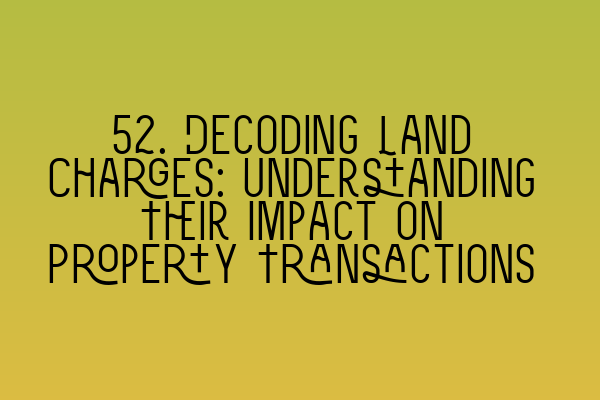Decoding Land Charges: Understanding Their Impact on Property Transactions
When it comes to property transactions, understanding land charges is of utmost importance. Land charges are legal interests or rights that are registered against a property or land. These charges can have a significant impact on the ownership and use of the property, and it is crucial for solicitors and property professionals to have a clear understanding of their implications.
In this comprehensive guide, we will decode land charges, explore their different types, and discuss their impact on property transactions.
What are Land Charges?
Land charges are legal interests or rights that affect a property or land. These charges are registered with the Land Charges Department and are recorded on the Land Charges Register. The purpose of registering land charges is to provide public notice of any rights or interests that may affect the property and to protect the interests of any parties with an interest in the property.
Land charges are usually associated with the ownership, occupation, or restriction of the land. They can be created by statute, common law, or equitable interests.
Types of Land Charges
There are various types of land charges that can affect a property or land. Here are some of the most common ones:
1. Restrictive Covenants
Restrictive covenants are agreements or promises made between property owners that impose certain restrictions or obligations on the use, enjoyment, or development of the land. These covenants can affect various aspects, such as the type of buildings allowed on the land, the use of the land, or the maintenance of the property.
It is essential to identify any restrictive covenants registered against a property as they can significantly impact its value and potential use. For example, a restrictive covenant may prevent the construction of additional buildings or limit the use of the property for commercial purposes.
2. Easements
Easements are rights or privileges granted to individuals or entities to use or access someone else’s land for specific purposes. Common examples of easements include rights of way, which grant access to a property through another person’s land, and rights to use utility services, such as water, gas, or electricity, that pass through or over another person’s land.
Easements can be granted by express agreement or can be created by prescription, necessity, or implication. It is crucial to identify any easements associated with a property to ensure that the rights and access of both the property owner and any affected parties are protected.
3. Mortgages
Mortgages are a type of land charge that involves the transfer of an interest in the property as security for a loan or debt. When a property is mortgaged, the lender (mortgagee) has the right to take possession of the property and sell it to repay the debt if the borrower (mortgagor) fails to meet their repayment obligations.
It is crucial for property professionals to identify any existing mortgages registered against a property. This information helps determine the financial liabilities associated with the property and any potential restrictions on its transfer or use.
4. Liens
Liens are legal claims or charges on a property that secure the payment of a debt or obligation. Liens can be created by statute or through contractual agreements. Common examples of liens include mechanic’s liens, which secure payment for construction or repair work done on the property, and tax liens, which secure payment of unpaid taxes.
Identifying any liens registered against a property is crucial, as they can affect the sale or transfer of the property. Additionally, failure to address liens properly can result in legal disputes or financial obligations for the property owner.
Impact of Land Charges on Property Transactions
Land charges can have a significant impact on property transactions. When buying or selling a property, it is essential to conduct thorough due diligence to identify any land charges associated with the property. Failure to do so can result in legal disputes, financial liabilities, or limitations on the use and enjoyment of the property.
Understanding the impact of land charges allows solicitors and property professionals to provide accurate advice to their clients and negotiate transactions effectively. It helps them navigate potential challenges, address any restrictions or obligations, and ensure a smooth and legally compliant property transfer or transaction.
Conclusion
Decoding land charges is essential for anyone involved in property transactions. By understanding the different types of land charges and their impact on property ownership and use, solicitors and property professionals can provide valuable advice and guidance to their clients.
At SQE Property Law & Land Law, we are dedicated to providing expert legal support and insights to professionals in the property industry. Our comprehensive SQE 1 and SQE 2 preparation courses equip aspiring solicitors with the necessary knowledge and skills to excel in their careers. For more information, visit our SQE 1 Preparation Courses or SQE 2 Preparation Courses.
Remember, understanding land charges is the key to successful property transactions. Stay informed, conduct thorough due diligence, and ensure the interests of all parties involved are protected.
Sources:
